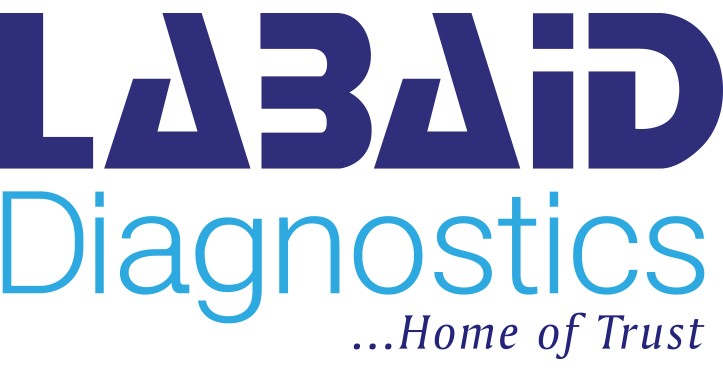Importance of Vitamin D
Vitamin D is one of the most important vitamins for our overall health.
Overview
Vitamin D is one of the most important vitamins for our overall health. Vitamin D is synthesized in the body when exposed to sunlight, and hence, is also called the sunshine vitamin. It has many functions including:
Each lung is divided into lobes. The bronchial tree running through the lungs is made up of the windpipe, bronchus, bronchi, bronchioles, and alveoli.
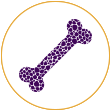
Osteoporosis
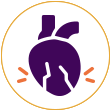
Heart disease

Hypertension

Diabetes

Infections

Cancer

Fractures in Elderly
- Vitamin D helps regulate the amount of calcium and phosphate in the body. These nutrients are needed to keep bones, teeth and muscles healthy.
- Vitamin D helps to protect against various conditions including
- Osteoporosis
- Heart disease
- Hypertension
- Diabetes
- Infections and Immune system disorders
- Cancer, especially colon cancer, prostate cancer, and breast cancer
- Falls in older people.
- Lack of vitamin D can lead to bone deformities such as rickets in children, and bone pain caused by a condition called osteomalacia in adults.
Symptoms of Vitamin D Deficiency
Signs and symptoms might include:

Low Sperm Count
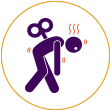
Low sperm motility

Abnormal sperm
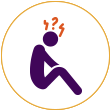
Genetic disorders

Obesity

Smoking

Harmonal Disorders

Hypospadias
- Bone pain, the deficiency of Vitamin D results in inadequacy in putting calcium into the collagen matrix into the bone structure resulting in bone and muscle pain.
- Fatigue, pain in the muscles and bones results in overall fatigue and tiredness.
- Muscle weakness, muscle aches, or muscle cramps
- Depression
- Regular illness or infection
- Hair loss
- Impaired wound healing
- Weight gain
- Anxiety or irritability
What causes Vitamin D deficiency?
itamin D deficiency is a condition wherein there is a reduced amount of Vitamin D in the body. The most common cause of vitamin D deficiency is the lack of sunlight exposure, which may be coupled with poor dietary sources. It can also be caused by
- Medical conditions
Medical conditions such as Cystic fibrosis, Crohn’s disease or Celiac disease. These diseases do not allow the intestines to absorb enough vitamin D through supplements. - Weight lossWeight loss surgeries make it very difficult to consume sufficient quantities of certain nutrients, vitamins, and minerals.
- Obesity
Obesity, Fat cells keep vitamin D isolated so that it is not released. - Kidney and Liver diseases
Kidney and Liver diseases reduce the amount of an enzyme needed to change vitamin D to a form that is used in the body. - Age
Age, The skin's ability to make vitamin D lessens with age. - Skin color
Skin color, Darker skin reduces the body's ability to absorb the ultraviolet radiation B (UVB) rays from the sun. Absorbing sunlight is essential for the skin to produce vitamin D. - Medications
Medications such as laxatives, steroids, cholesterol lowering drugs, seizure control drugs. - Breastfeeding
Breastfeeding, Infants who exclusively breastfeed need a vitamin D supplement
Overcoming Vitamin D deficiency
The following can help increase the Vitamin D content in the body:

Outdoor activity for 10 to 15 Min

Eating more Vitamin D Rich Foods
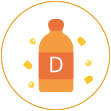
Taking Vitamin D Supplements
- Outdoor activity for 10-15 minutes in the sun every day
- Eating more Vitamin D rich foods e.g. mushroom, fish, egg yolk, fortified cereals
- Taking Vitamin D supplements. However, this must be done only after consulting with the doctor.
Toxic effects of excess Vitamin D
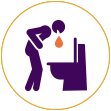
Nausea & Vomitting

Frequent Urination

Bone Pain

Weekness
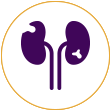
Kidney Problems
- Vitamin D toxicity, also called hypervitaminosis D, is a rare but potentially serious condition, usually caused by megadoses of vitamin D supplements.
- The main consequence of vitamin D toxicity is a buildup of calcium in the blood (hypercalcemia), which can cause nausea and vomiting, weakness, and frequent urination. Symptoms might progress to bone pain and kidney problems, such as the formation of calcium stones.
Daily requirement of Vitamin D
- The amount of Vitamin D needed on a daily basis depends on your age. Average daily recommended amounts from the Food and Nutrition Board for different ages are listed below in International Units (IU):
| Birth to Life Stage Recommended Amount | Recommended Amount |
|---|---|
| Birth to 12 Months | 400 IU |
| Children 1-13 years | 600 IU |
| Teens 14-18 years | 600 IU |
| Adults 19-70 years | 600 IU |
| Adults 71 years and older | 800 IU |
| Pregnant and breastfeeding women | 600 IU |
How is Vitamin D deficiency diagnosed?
Doctors may order below blood tests:
- Vitamin D 25, Hydroxy
This test measures the level of vitamin D in the blood. Two forms of vitamin D can be measured in the blood, 25-hydroxyvitamin D and 1,25-dihydroxyvitamin D. The 25-hydroxyvitamin D is the major form found in the blood and is important for bone health and growth. This test is useful for the diagnosis of Vitamin D deficiency and Hypervitaminosis D. It is also used for diagnosis of causes of Rickets & Osteomalacia and for monitoring Vitamin D replacement therapy. - Vitamin D 1, 25 Dihydroxy
1,25-Dihydroxy vitamin D plays a primary role in the maintenance of calcium homeostasis. A part of circulating 25-hydroxy vitamin D is converted to 1,25-dihydroxy form in the kidneys. This test may be useful for evaluating calcium metabolism in individuals with hypercalcemia or renal failure in addition to Vitamin D, 25-Hydroxy testing.
How do you get Vitamin D?
Sources of Vitamin D include:

Sunlight

Oily fish

Cheese

Fortified Cereals and Juices

Mushrooms

Egg Yolk and Red Meat

Milk Products
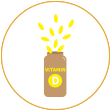
Dietary Supplements
- The body forms Vitamin D naturally after exposure to sunlight. Just 10-15 minutes in sunlight is sufficient for the skin to produce Vitamin D.
- Foods such as
- Oily fish e.g. Salmon, trout
- Cheese
- Mushrooms
- Egg yolk
- Fortified milk, cereals, juices.
- Dietary supplements
